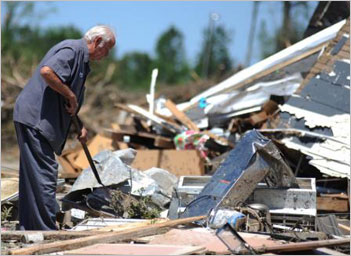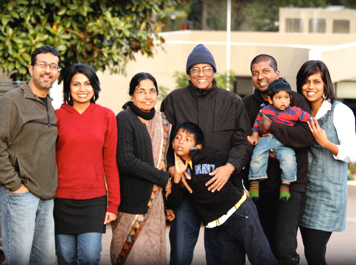I think the questions of what is the right thing to do when conflicts arise between parents and children are not what arise out of Creflo Dollar and his daughters but what arises out of the relationship between God and his children. All of life is governed by our understanding of God, of Jesus and the Holy Spirit; life is completely dependent on our personal relationship to the Triune God and God’s will for our lives. We are a part of God’s family. He is our father and we are his children.
The issue is not just about corporal punishment. Is there room in our theology of God’s love for punishment and consequences to bad behavior? Is there a strong theology of sin? Who defines the sickness of sin in the human person and its antidote: Psychologists or God? Do we understand that God does not want us to go astray and die and that it is His love which prompts him to discipline, punish and judge?
The dawn of creation and the advent of man and woman in the Garden of Eden remind us of the refrain “And God saw that it was good”. Even when God provides all that is good and warns us to keep away from evil, like Adam and Eve we would rather trust the devil than God’s goodness. In the 21st century and with the best of psychology are we going to fare any better without God?
We think that we can pick what is right and wrong and somehow there is an innate human capacity to discern truth. At best our collective consciousness can only reflect our collective guess at what is right and wrong. And history has proven that often this collective guess is wrong. We are dependent on a God who reveals himself and sets laws that determine the boundaries of what is right and wrong.
God the Father gave the Ten Commandments and sent the prophets to keep us on track.
Jesus takes that further in the Beatitudes in Matt 5: 17-20 when he says:17 “Do not think that I have come to abolish the Law or the Prophets; I have not come to abolish them but to fulfill them. 18 For truly, I say to you, until heaven and earth pass away, not an iota, not a dot, will pass from the Law until all is accomplished. 19 Therefore whoever relaxes one of the least of these commandments and teaches others to do the same will be called least in the kingdom of heaven, but whoever does them and teaches them will be called great in the kingdom of heaven. 20 For I tell you, unless your righteousness exceeds that of the scribes and Pharisees, you will never enter the kingdom of heaven.
And this is what the Holy Spirit will do: “But when the Helper comes, whom I will send to you from the Father, the Spirit of truth…, when the Spirit of truth comes, he will guide you into all the truth. (John 15:26; 16:13). He is our Helper with truth.
All civil societies have a legal system with judges to enforce the law. God the Father is the judge, Jesus returns as the Judge and the Holy Spirit convicts the world of sin, of righteousness and judgment. This is what keeps hope alive in the kingdom of God, that there is an end to evil and only what is good will be preserved.
Having established the need for the revelation of God’s goodness and love, His Truth, law, and judgment, we have the theological foundations for Christian parenting.
There is no doubt that parenting is one of the most sacred duties and a difficult one. Every parent makes mistakes and has regrets. To walk the thin line between love and discipline and to make discipline redemptive does not come easily. On the other hand, there is no greater joy for a parent than to see good children. This is our hope that our children will be mature: “for those who have their powers of discernment trained by constant practice to distinguish good from evil. Hebrews 5:14. We are increasingly living in cultures where we have little help in doing this.
Today, some forms of parenting and discipline have little or no consequences to disobedience. In such situations the child knows she can get away with anything. The boundary between a parent and child is lost. Neither in the home, in the school nor in society are there sufficient structures that provide for discipline. The result is a self-willed child that grows up knowing full well that he can get away with anything and there is nothing anyone can do about it. The breakdown of the family, the chaos in the classrooms, and the violence in the streets are just some samples of this anarchy.
The most common form of discipline for a child who disobeys is when the parents call for a time out and send them to their room. For many parents from the non-western world, sending a child away to a room is a questionable punishment. It accomplishes little. The worst thing that can happen to a child is to sit alone and cry in an empty room. This isolates and creates loneliness and alienation and loss of relationship with the parent. The sense of belonging has been ruptured and a sense of forsakeness can emerge. The resultant anxiety is the loss of the parent and for a little child this is traumatic and can be a major source of anxiety disorders. At the point where the child feels and knows that she has not only disobeyed and suffers the pangs of guilt, there is the added shame of knowing that you have let down the parent. Isolation, disengagement, and removal of the child from the parent’s loving presence may do more damage than good.
On the other hand spanking is seen as the answer to all behavioral problems in a child. Let us ask ourselves: Is punishment redemptive and does it flow from the heart of love? For many parents punishment can become a release of our own sinfulness and frustration. Punishment can easily get out of control and become a release of anger that is disproportionate to the child’s disobedience. For some parents, a spank would be considered more humane because it is physical and the child remains in the love of the parent and not removed from it. (Here I am not talking about uncontrolled spanking that is injurious physically and psychologically).
Corporal punishment is common and seen as a more Christian and biblical way of discipline for children particularly in India. Remember: “Spare the rod and spoil the child” is not a biblical saying. However, Hebrews 12:6–7 reminds us: 6 For the Lord disciplines the one he loves, and chastises every son whom he receives.” 7 It is for discipline that you have to endure. God is treating you as sons. For what son is there whom his father does not discipline? Here again, the bible is not recommending spanking or not spanking. Physical and corporal punishment is not what is being recommended as the answer for all disobedience. What is at stake is the father son relationship. It is meant to be a relationship of love. Love contrary to popular opinion is not lost because there is punishment. In fact it is the strength of love, which calls for discipline and chastisement.
Having grown up in India and being rebellious and sinful I have received my own share of corporal punishment. Was this physical abuse? Did this damage my psyche? NO. Whether it was from parents or teachers I have no regrets or damaged memories. Even as a child and as a youth I knew it was for my benefit. Did it always flow out of love? NO. Was it always redemptive? NO. Did it help in keeping me in line? YES. Were there times when it got out of hand and I was the recipient of adult tempers? YES.
What is very important to remember is that both the parent and the child are sinful by nature. Just because I am a parent or teacher that does not mean that I am always right. There are times when I am wrong. As parents and children we are both in need of God’s laws and truth that governs us. We are accountable not just to the changes of culture, psychology or the latest trend. We are accountable to the love of God that clearly provides boundaries, laws, discipline, punishment and judgment. As parents, teachers and children let us become more and more conscious that we are all accountable to God and in need of discipline when we get out of hand.
Discipline is good because it helps us as parents and children realize that there are clear boundaries that preserve us and keep us in the goodness of God. Punishment is good so that we can grow up knowing that there are consequences to sin or else we will just continue to sin and die. Judgment is good because without it we will lose all capacity to discern good from evil as well as lose the hope that there is an end to evil.
The writer is the general director of Inspire International, and senior pastor at Eternity Church, Virginia, US.





















